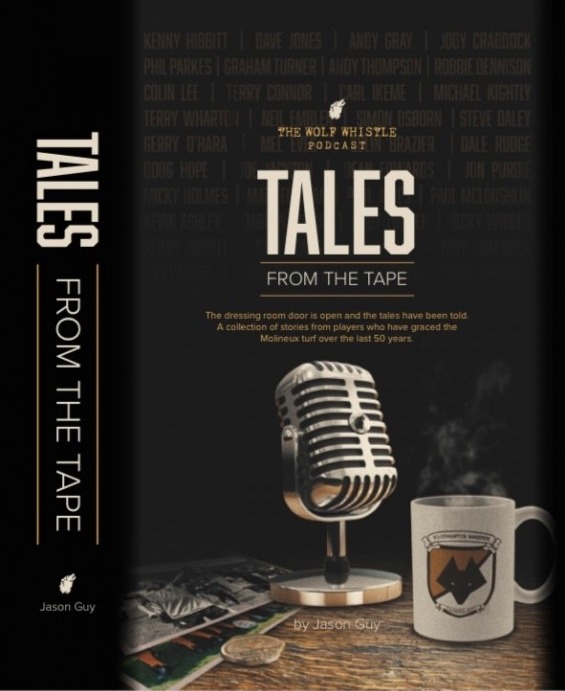
TALES FROM THE TAPE
GERRY O'HARA - HONESTY IS ALWAYS THE BEST POLICY
Gerry O’Hara arrived, on time, dressed as sharp as his football career had promised to be. “I bet you’ve had all the big-guns on,” he says, playing down his career, which all started a stone’s throw away from Molineux in nearby Red Cross Street.
Born to Irish parents just a quarter of a mile from his future stomping ground, his father was a keen Gaelic Footballer whom, in Gerry’s words, ‘struck a lovely ball’. Gerry’s father was a naturally two-footed athlete who had clearly passed on his genes to his son. His parents came over after the war and met in Wolverhampton at a dance near Molineux. It’s as if it was all written in the stars.
“I went to a Catholic School, St Chad’s in Wolverhampton, and was spotted by scouts after initially representing the town and then the county. There were some other good players on the radar. I’d be about 12 or 13 at the time and I played against a certain Mel Eves who was at Wolverhampton Grammar School.”
That was the first time their paths would cross, as later they would both be plying their trades respectively for their hometown club. Locally though, there was a fine array of talent. “There was also a lad called Steve James from Coseley who went on to play for Manchester United and I had been playing with his brother Adrian who had captained England Schoolboys and signed for Coventry but never made it,” adds Gerry. “There were some great players coming through locally at the time.”
Gerry though never feared any competition signing for Wolves as an apprentice in 1973 at the age of 16, and subsequently professional terms aged 18 in 1975, after staying on at school to complete his O-Levels. “I was living the dream,” Gerry exclaimed, and then further admitted that it wasn’t all plain sailing and the first hurdle was to get a pro contract.
“We were allocated jobs around the ground. Jobs included getting the home and away dressing rooms ready for games and keeping them clean and tidy. I’ve got to be honest, it must have been like being in the army. Jack Dowen, a member of the backroom staff, would inspect them before we went home. We stayed till it was right.”
Gerry only saw this as another obstacle before reaching his dream, but there were plenty more barriers to come. Derek Dougan, who was a hero at the club, proved obstructive in an early encounter and they certainly didn’t take kindly to each other despite their Irish roots. “Back in those days you’d also be allocated two professionals for you to clean their boots. I’d worked hard on them all year and you could see your face in them when I’d finished.”
On £8 a week, Gerry looked forward to the Christmas bonus which provided much needed compensation for cleaning the professionals boots. “My wages were £8 a week, less the 56p national stamp, so I’d walk off with £7.44,” he says. “When December came, I was looking forward to the boots bonus. Danny Hegan gave me a fiver, which was nearly a week’s wage so I was over the moon. I gave Derek his boots and he didn’t say anything, infact he was quite dismissive of me. I didn’t want to force the issue so I gesticulated that his boots were ready and I sort of hung around.”
Derek soon caught on, the deep-pocketed Northern Irish international didn’t forget his financial obligation and handed over a shiny 50 pence coin to Gerry. “I left it there. What an insult! I told Derek in no uncertain terms that I wasn’t desperate and he could keep it. Several years later I bumped into Derek and he reminded me. He was certainly a Marmite character.”
Gerry recalls that Derek was no shrinking violet and this would wind up manager Bill McGarry. Derek almost challenged the leadership of McGarry which wouldn’t be well received. “Derek was an icon at the club and he was the biggest star within the dressing room and on the pitch,” says Gerry.
Derek, though, wasn’t the only personality that Gerry would clash with. “Bill McGarry has your future in his hands and he knew it. I bumped into him decades later whilst holidaying in Jersey and he spoke more to me then in a quick chat than he did to me in six years at the club!”
In Gerry’s first season as an apprentice at the club, 1973/74, he had shown that he was worthy of a place in the Central League playing twice and fitting in comfortably amongst the senior professionals. These appearances came amidst the national coal and electric strikes which meant that all games were played during the day, not at night, and it was in the light of day that O’Hara was spotted.
“It was quite lucky really,” he recalls. “Bill McGarry was back from training and cast his eye over the last 10 minutes of one of the games. I came on just as he came over to watch, I hit the post then set up Peter Withe for a goal. Arguably the best 10 minutes football of my life!”
From that day on, Gerry believed that he had stuck long in the memory of Bill McGarry. “Those days it was only one sub so I was lucky to get a chance, but I took it. There were four sides at the time and making the first team really did seem a million miles away.”
In relative distance terms, his first team bow was three years away, but was worth the wait as he proudly donned the old gold and black for his hometown club.
“I made my debut in 1976 against Ipswich Town in an FA Cup 4th round replay, having started in the 3rd team that season. I’d then played 16 games in the Central League and I was developing quickly and playing well… considering there were over 60 on the playing staff at the club!”
Gerry recalls the army of talent which was at McGarry’s disposal. “There was John Richards, Kenny Hibbitt, Jim McCalliog, he was my favourite. There was Frank Munro and Mike Bailey. So many leaders. There was also Derek Dougan, I never played with him in the first team but did in the reserves.”
McGarry ruled with an iron rod. A strict disciplinarian, a man of few words and desperately lacking today’s pre-requisite of ‘man management’ but it was his way only. “He ruled with fear and we did fear him. He was a good football man but a poor man manager. We played away at Ipswich in what would have been my fifth or sixth game. We lost 3-0. Kevin Beattie had invited us to his nightclub and McGarry caught wind of it. We were 2-0 down at half time and McGarry let loose telling us straight that we weren’t going out tonight and we were a bunch of *****”
Gerry played number seven that day, and his next door neighbour in the dressing room, the number six, had had enough. “Derek Jefferson stood up and told McGarry to shut the **** up and we all ended up in the nightclub after all.” Gerry and company spent the evening putting the world to rights, instead of enjoying what ended up in being unpleasant surroundings. They then decided whilst becoming inebriated that it would be a grand idea to call a team meeting on their return to Molineux.
“Bobby Gould led the rally and we decided to call what ended up a forced meeting with Bill McGarry.” Gerry, being seen as an outspoken yet confident young professional, was asked to speak on behalf of the younger players. “Bobby spoke first and he told the manager that we were disappointed with the way he had spoken to us. Then it was my turn. I told him that it was difficult to knock his door and that there was a fine line between fear and respect.”
As eloquently as Gerry had thought he’d put his points across along with the senior spokesman in Gould, he was met with an angry tirade by McGarry.
“You’re all a bunch of cheats!” the manager exclaimed. And that was that, meeting closed.
Gerry’s 1975/76 debut season saw Wolves relegated and Sammy Chung had taken over the new campaign as manager. Wolves reserves were scheduled to be playing away at Liverpool. “It was in the days where the reserve team games would be played at the actual grounds, so that day I was looking forward to playing at Anfield. I’d heard rumblings though that Wille Carr was struggling with an injury and there were rumours that I’d be back in the first team to face Millwall at home. I waited around as I was sure I was getting the nod but it never came.
“I went on the coach to Liverpool and was looking forward to the game but disappointed not to get a recall to the first team. Instead I played against Sammy Lee and chased his shadow for the day, he was outstanding. The Central League was great to play in when stepping up as a youngster but not when you were fighting for your first team place and that game didn’t do me any favours. I remember asking young Sammy to hang on and give me a breather!”
Gerry recalls his Central League debut as clear as day, when in his words he was introduced to the ‘dark arts’. “We played Leeds and Terry Cooper was marking me who was a real hard-man. These players were first-team regulars coming back from injury or in most cases suspensions and they played in these games as they would in any games. We played Bolton one time, a player flicked me and I retaliated and got sent off. These were tricks they used and traps they would set for young players like me. My Dad was watching and told me what he thought of me after the game.”
Brian Garvey was the reserve team manager at the time. He had done well with the youth team, earned his stripes and climbed the ranks. However, Brian and Gerry didn’t see eye-to-eye. “We were training down at the racecourse and it was the middle of winter. I’d run down to join in with the session and as I arrived was greeted with: ‘What do you think you’re doing?’ as I tried to join in with the shooting drill. It must have been minus 14 degrees.
“I’m standing behind the goal catching the balls as they come flying past. Brian kept stopping the drill to lace into lengthy tirades moaning at Bob Hazell. I’d had enough in the end so I politely told Brian to get on with it and that Bob had got the drift at what he’d been saying. Brian responded with a volley of abuse and sent me back to Molineux.”
Gerry wasn’t doing himself any favours at this point especially after a cheeky bit of backchat aimed at Brian. “I moonied at him. Sammy (Chung) caught wind of it, suspended me and sent me home with no wages for a week. I was living with my parents at the time and had to explain to them my actions – they weren’t best pleased.”
Controversy seemed to follow a young Gerry O’Hara around and I couldn’t stop myself from thinking that if he’d kept more tight-lipped – or even his shorts up that fateful day at the racecourse – this could have been a player that had played triple- figures in games for the Wolves. Whether he was easily led, or easily distracted, he certainly didn’t do himself any favours off the pitch, especially on one particular day.
“I was with Lofty (Phil Parkes) and we had played away at Sheffield Wednesday in the reserves. We had planned to meet Mike Bailey in the Press Wine Bar and one drink led to another, and another and… I’m not proud. Lofty never drove at the time so we stupidly jumped in my car. We’d only got as far as The Barley Mow on the Stafford Road and I had hit the kerb.
“The police arrived in an instant and asked if I’d had a drink which I duly replied that I hadn’t – well, maybe one. I gave a breath-test and was over the limit. They arrested me and put me in the back of the car and slammed the door on Lofty, he wasn’t best pleased.”
It was at that point the rookie officer had realised he was in possession of two jewels in the town’s crown. “The policeman then realised we were Wolves players and Lofty was remonstrating as he had no way of getting back home. Phil told them in no uncertain terms he was not catching a bus home so they arrested him too. This came after they were arguing amongst themselves as to who would bundle the 6ft 4in goalkeeper into the car.
“We arrived at Red Lion Street and to Lofty’s amusement they asked him to remove his belt and laces in case he was going to hang himself. We were summonsed the next day to see the chairman at the time, Harry Marshall, to apologise. We did, and even made ATV News that evening!”
Gerry certainly wasn’t proud of his actions and almost relayed them with an air of regret. The beginning of the end was now nigh. But it was neither his on the pitch performances nor his off the pitch antics that put paid to his time in the old gold and black.
“I started to feel unwell,” he recalls. “My ankle was swollen and I was diagnosed with Rheumatic Fever. It attacked my ankle and it made me extremely ill. I remember going to the hospital to be treated and seeing others who were suffering from the illness too. Some of the cases were horrific and it was quite frightening at the time.”
Gerry was in good hands and was thankful to how the club stood by him, in his hour of need. “The club were fantastic and I couldn’t ask for any more. Kevin Walters, brother of the actress Julie Walters, was the physio and he was brilliant with me. I was told by the specialist that I would never play again but the club gave me another 12 months to help me get fit and in the end they paid my contract up. They really couldn’t have been any fairer with me.”
It was a sad end to Gerry’s time at Wolves and it really didn’t end up the way it was meant to be. Staggered starts in the first team, coupled with a tendency to speak his mind, certainly didn’t win the management over but his Wolves links didn’t end on his departure. “Mike Bailey had taken over at Hereford and he gave me a pre-season. They were in the Fourth Division at the time and to be fair, despite my recent illness, I was the fittest one there! I was given £40 a week at the time and needed expenses as I was driving daily from my home in Wolverhampton to Hereford. Mike refused to pay, I refused to play and we parted ways.”
Worcester City was the next destination for Gerry, who was surprised by the standard of the football, and there was also a chance to sign for our neighbours up the road which would have severed any links with his boyhood club. “I was gobsmacked at the standard at Worcester. It was a great standard to be fair. I enjoyed my time at Worcester and was then given a chance to get back in the league… with West Bromwich Albion.
“I seriously had to ask myself the question: ‘Could I play for the Albion?’ In the end, the decision was made for me and it never really materialised.” Gerry then got injured and damaged his knee, and from thereon in he was doing the non-league circuit and knew that he had lost his chance of ever reaching the dizzy heights of league football again.
Gerry though, remained firm in his summary that he ‘wouldn’t change a thing’. When asked his biggest regret he replied: “I didn’t play 100 games for the Wolves. If I’d stayed fit and under the right guidance I could have done. I’d have had a better chance under Sammy.”
Gerry then paused, he was never one to think before he spoke in his playing days but he concluded: ‘I’d have loved that… the Wolves owe me nothing.”



